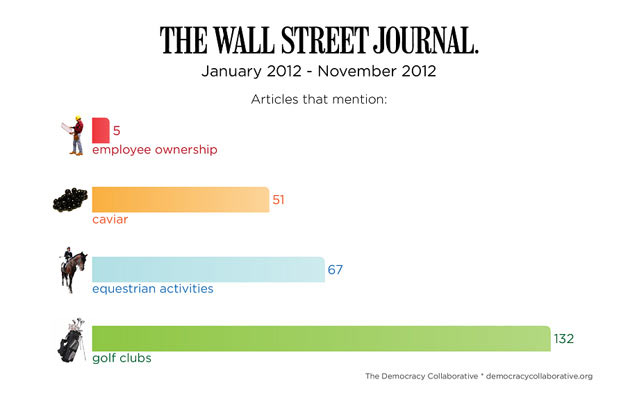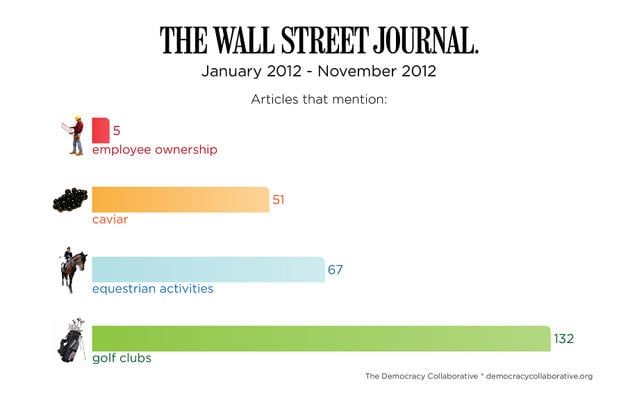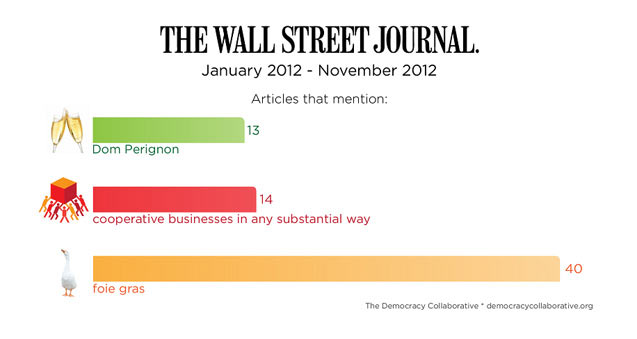
Truthout is an indispensable resource for activists, movement leaders and workers everywhere. Please make this work possible with a quick donation.
The question of how the ownership of capital should be structured in a democratic society was raised by none other than Margaret Thatcher’s authorized biographer.
Just three years ago, I worked with the staff at the Democracy Collaborative to write this article, which made a very basic point about the way systemic solutions to economic inequality were treated by the business paper of record, The Wall Street Journal. As you can see, business structures that directly democratized ownership of the economy received short shrift:


But three years later, as the crisis of inequality continues to deepen – and after Piketty and Corbyn and Sanders and Pope Francis – the WSJ seems to have changed its tune. The system question – that is, the question of how the ownership of capital should be structured in society that purports to be a democracy – is clearly on the table in a remarkable long essay published last month, written by the authorized biographer of Margaret Thatcher.
The piece begins with the simple imperative: “If Western countries want to disprove the dire forecasts of Karl Marx, we must think creatively about how to make the middle class more prosperous and secure.”
Let that sink in for a minute. The threat, according to this featured piece in The Wall Street Journal, is not just Marxists and their ideas, but the possibility that they might be right about capitalism after all. The author strikes the same note in his conclusion:
[…] Marx did have an insight about the disproportionate power of the ownership of capital. The owner of capital decides where money goes, whereas the people who sell only their labor lack that power. This makes it hard for society to be shaped in their interests. In recent years, that disproportion has reached destructive levels, so if we don’t want to be a Marxist society, we need to put it right.
And what is the alternative that this author sees as the way forward to avoid the hypothetical looming dictatorship of the proletariat? Simply put, the author insists that we need to “take ownership much more seriously,” and put democratic control back into corporate governance:
Why are so few companies owned by the people who work for them, and why do both liberal and conservative political parties not offer greater incentives, such as tax advantages, for this to change? It is extraordinary that the joint stock company, the foundation of modern commercial and industrial wealth, is still so little influenced by the views of shareholders. This is perhaps most evident in the preposterous salaries paid, particularly in the U.S. and Britain, to top executives of public companies. If the owners of these companies truly exercised authority over what is theirs, this wouldn’t happen. If these enterprises had grown over the last 20 years at the same rate as pay for the men who run them (it usually still is men), no one would be talking of a crisis of capitalism.
But even more strikingly, the author goes beyond the idea of shareholder democracy, and insists on a large-scale push to imagine and implement the democratization of wealth, not through redistribution, but through newly revitalized forms of cooperative and democratized ownership and control of our economic institutions:
The Victorians were more imaginative than we are about principles of mutuality – credit unions, building societies, the cooperative movement. Such organizations feel creakier in an age when people want larger sums, faster. But is it really beyond the skill of our great modern business brains to develop these concepts and adapt them to modernity?
Admittedly, this is a single article that does little in the long run to correct the systemic bias revealed in the graphs above: The WSJ is by no means running regular coverage of the growing number of experiments in community wealth building and democratized cooperative ownership that are emerging throughout the nation (yet).
But the oddity of the WSJ, bastion of capitalism’s most defended ideological heights, running such a forceful indictment of the current system and its tendency to reproduce and deepen levels of inequality inimical to democracy cannot be ignored: The system question may not quite be on the table in the mainstream media in the way it ultimately needs to be, but it’s getting close.
A terrifying moment. We appeal for your support.
In the last weeks, we have witnessed an authoritarian assault on communities in Minnesota and across the nation.
The need for truthful, grassroots reporting is urgent at this cataclysmic historical moment. Yet, Trump-aligned billionaires and other allies have taken over many legacy media outlets — the culmination of a decades-long campaign to place control of the narrative into the hands of the political right.
We refuse to let Trump’s blatant propaganda machine go unchecked. Untethered to corporate ownership or advertisers, Truthout remains fearless in our reporting and our determination to use journalism as a tool for justice.
But we need your help just to fund our basic expenses. Over 80 percent of Truthout’s funding comes from small individual donations from our community of readers, and over a third of our total budget is supported by recurring monthly donors.
Truthout has launched a fundraiser, and we have a goal to add 273 new monthly donors in the next 72 hours. Whether you can make a small monthly donation or a larger one-time gift, Truthout only works with your support.